As a writer or editor, your livelihood depends on the quality of your writing being top-notch. Sure, you are confident in your skills and have proven time and time again that you can write for quality. Still, it would be nice if there was a tool to help you keep the quality high. Do they even make tools for that? If they do, which is the best writing tool out there? Grab some coffee ☕️, and let’s get into it!
Pssst… If you would rather skip directly to the answer: the Grammarly Chrome Extension is the best writing tool out there. You need an account to use it, and the Grammarly Free version is sufficient for most people.
Why Do You Need the Best Writing Tool?
If you are like me, you are probably asking, “why do I need a writing tool?” You are already a great writer, and your friends, colleagues, and audience members probably already sing your praises about it. Everyone looks to you as “the best writer they know” and looks forward to seeing more of your eloquent words strewn upon some pages.
Even if you do not fall into that over-dramatized scenario, you are probably confident in your ability to construct a coherent sentence. You, like everyone else, were required to complete some compilation of writing materials before you were allowed to graduate from high school. That was probably no problem for you at all. So why would you need a tool to help you write?
- Speed – Most writing jobs contain an element of urgency.
- Accuracy – Nobody wants their writing rejected and graffitied with a multitude of red marks.
- Consistency – Your audience wants to know they can rely on your excellent work.
Speed
Whether you are a blogger, a columnist, or a novelist, deadlines must be met. Being faster is almost always better, especially in a professional writing context. The more content you can pump out, the more people will see your words and feel affected. Beyond that, we all have to pay the bills, and the more content we can create, the more money we can make.
Using a tool to help you write is almost a requirement. Do you ever “get into the flow” when you write? Do you feel like the words fly right out of you onto the page? Does it ever feel like you are channeling some inner power, and it yearns to be unleashed into a piece of content?

Well, amid all the divination, you probably do not want to stop every few seconds and correct some spelling or grammar errors, right? You would probably prefer to let it pour out of you, automatically sensing what you intended to write; then, at some later time, you can go back and tweak it to be perfect.
This is the prime opportunity for a tool to help speed things up! You can stop worrying about your writing being perfect the moment you write it because the utility will correct some things automatically. You can also defer making it perfect until later when a “good tool” will probably offer some additional help. Altogether, you can work faster because you are worrying less.
Accuracy
If you are like me, you are probably horrible at spelling. Perhaps your grammar leaves a bit to be desired. Maybe your words come out in the wrong order, making your writing more confusing for your audience to understand. Wouldn’t it be nice if some of these things could be corrected automatically?

Do you ever use the wrong word, like using “there” instead of “their” or “weather” instead of “whether?” What about using a word incorrectly in a sentence, like “There are a lot of ways to built backlinks for your website.” What about using a word that does not exist, like “The technotronics behind the best writing tool are amazing.”
The best writing tool can help you with all of these problems. It can also correct spelling and grammar. Incorrectly used words can be easily highlighted, informing you that they need adjustment. This tool might even spot words that seem like they should be words but simply are not. Your accuracy can be improved just by using the best writing tool available.
Consistency
Unless you are a “writing Iron Man,” you probably split your longer pieces over multiple days. This allows you to take a mental break, which, in turn, improves your focus and motivation. It does come at a cost.

Have you ever written something one day, then the next day, when you start writing again, the tone of your work is entirely different? Maybe the voice behind your writing is a little divergent from the previous day. Perhaps you were writing with absolute confidence yesterday, and today you are writing a little more meek or compassionate. What if you could speak to your audience in a more consistent voice without expending too much effort to audit it yourself?
A good utility can spot a change in voice. It can even help with the delivery of your message to your audience. Your audience can benefit from you using a helpful tool because your message becomes easier to understand. Remember that is the most important thing; your audience must understand you if you want to reach them.
How to Determine the Best Writing Tool
What would you look for in a good writing tool? Are there specific features you need? Do you want the mechanism to be active or passive? Would you prefer it front-and-center or in the background? What about keeping your voice consistent? How about giving your insight into how an audience will receive the message you are conveying? Is price a huge factor?
Pssst… You can still get value from the best writing tool even if you run your blog like a business and outsource the writing to an employee. You are most likely still the “editor,” meaning you are probably still making the final edits before the blog post gets published. This tool can help you even in this role.
Important Features
Some critical features that must be present regardless of your writing profession. For instance, I absolutely must have spelling help. I also tend to drift from one type of writing voice to another, which is highly dependent upon my mood. I also like something that tracks how much I write and how much help I need to complete my writing correctly.
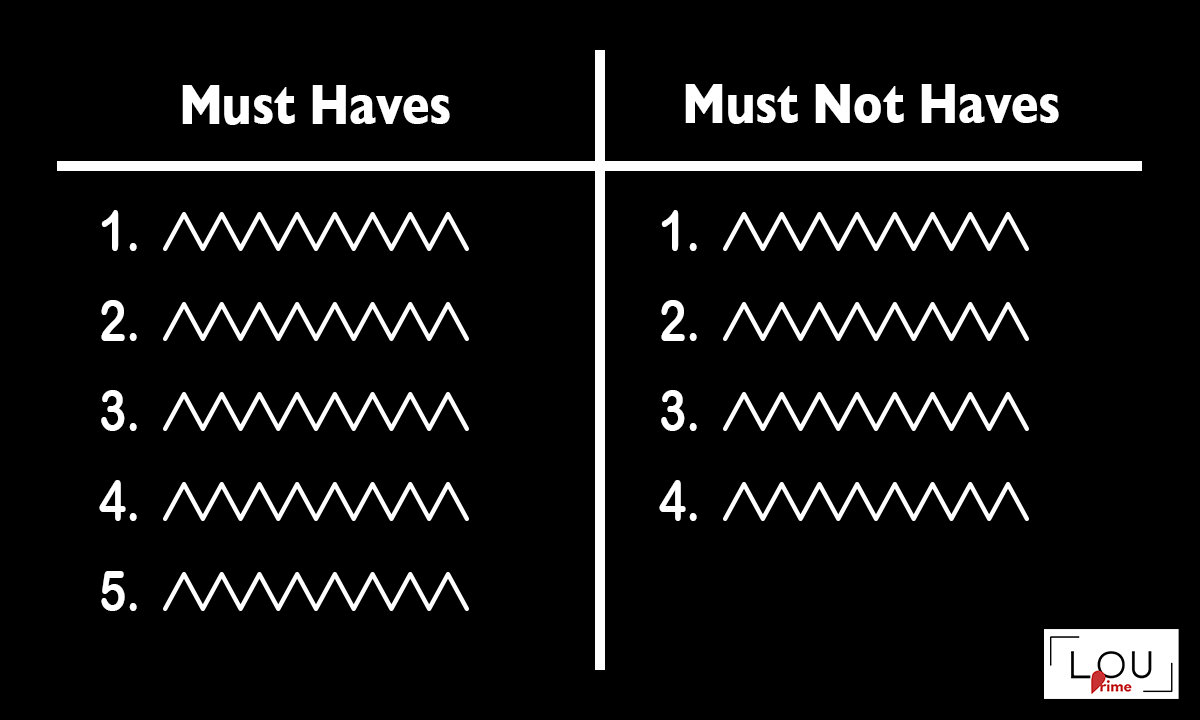
Your list of required features might be different. Maybe you want something that helps you with grammar. Or perhaps you are overly verbose and need help tightening up the delivery. Some people may want to write in a language they are currently learning. Whatever your use case, it is paramount to understand what you want from a tool.
My top recommendation is to compile a list of the most critical features you want from a writing tool. When looking around for the best writing tool, you can reference this list to determine if the software has features significant for you. For example, your list might look something like this:
- Corrects most spelling mistakes automatically based on the context.
- Encourage my writing to be more focused and concise.
- Keeps track of my accuracy, word usage, and other critical stats over time.
- Instructs me on how to use my chosen language correctly.
Regardless of which problems you want to solve, your selected tool must have a solution for as many of them as possible. Having the list handy, especially while doing your research, is vital for identifying the best writing tool for you.
Active vs Passive
Everyone’s preferences are different. Some people like direct instruction. Other people like something a little more “behind the scenes” to help guide them. This is a vital factor because both perspectives have their advantages.
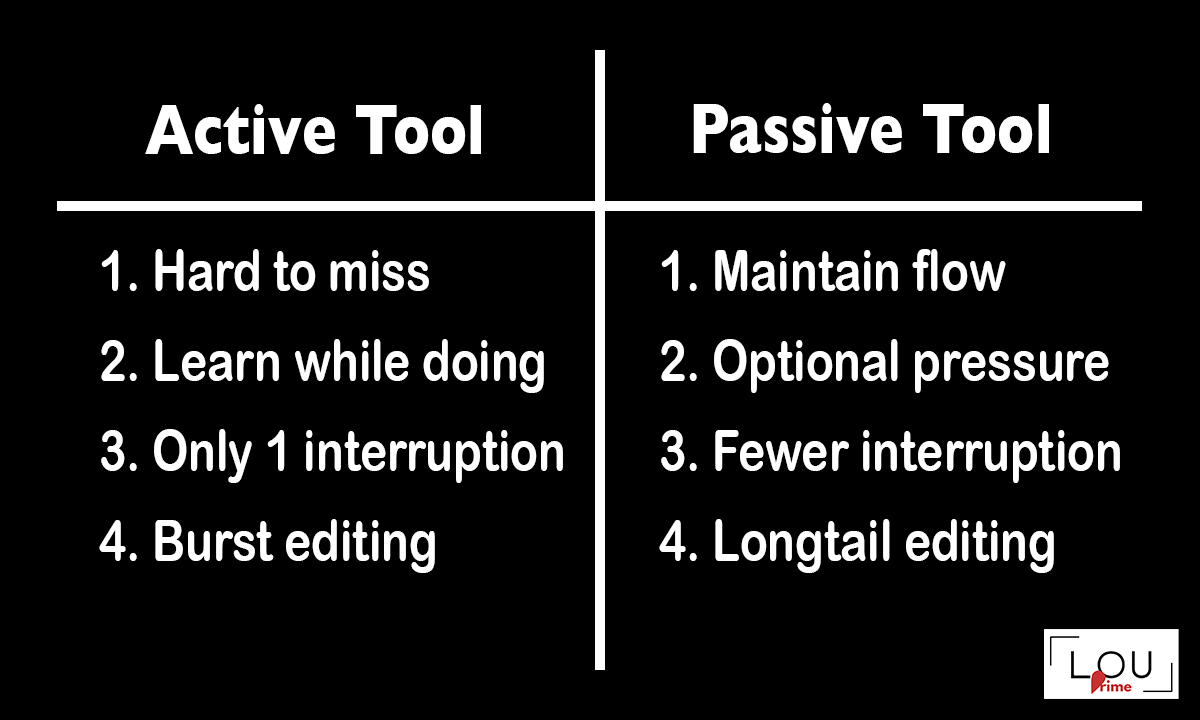
When guidance is front-and-center, it becomes harder to miss. You might get more value from a tool interrupting your flow to inform you of a problem. Perhaps you get more motivation from a tool that makes a big deal about a mistake once. Then putting in that extra effort to prevent the interruption in the future seems extra rewarding.
Other people prefer that the guidance fades more into the background. Maybe you like seeing a less prominent notification instead of a larger one. Perhaps substantial interruptions distract your focus and make you lose your place. What if you could come back later and address all the problems in one fell swoop instead of being interrupted by every missing punctuation mark?
Whatever your preference, your best writing tool should let you control how to see the guidance at your preferred pace and interruption level. It should help you to improve your speed, accuracy, confidence, and rhythm. If it hinders you in any way, you might have the wrong tool.
Progress Insights
For me, the best writing tool would keep track of my writing skills. It would give me a frequent report on how I have progressed. Improvement is critical to me. When I am not improving, I feel stagnant. I lose motivation.
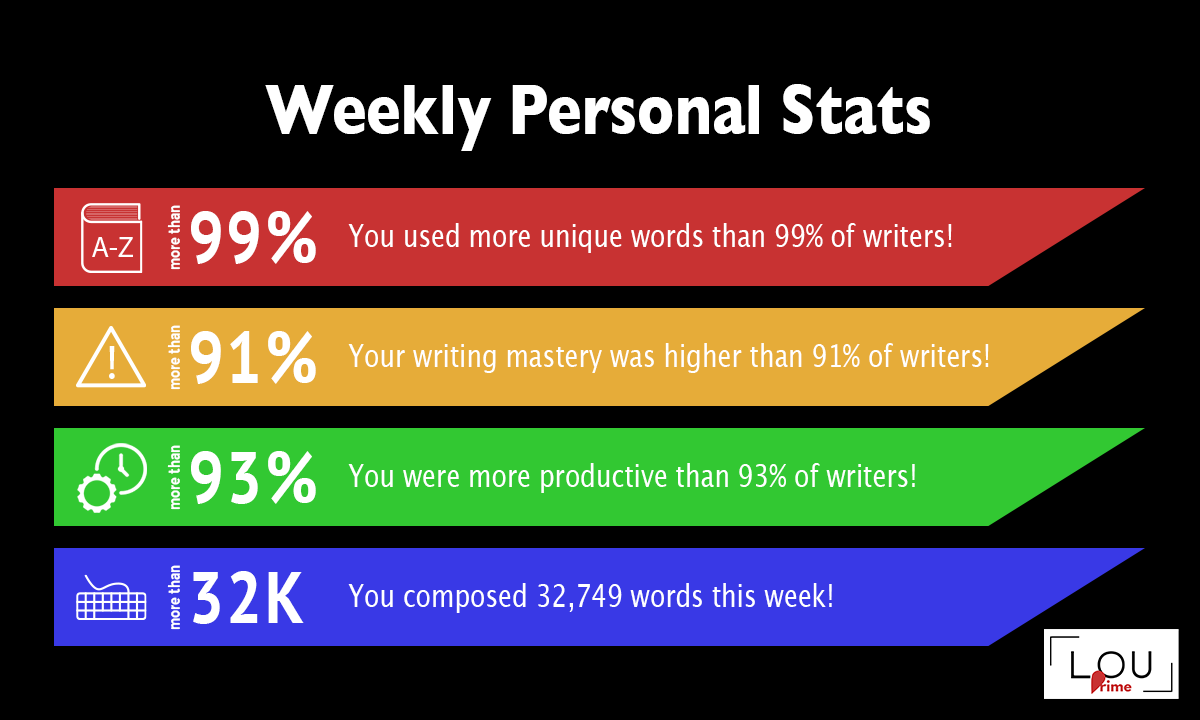
Sometimes it is even motivational for me to understand how I am progressing compared to others in a semi-competitive way. Everyone has a different level of competitiveness. The best writing tool should motivate you in a way that you receive the most benefit. If you like competition, it should show you how you compare against others. It should show you personal stats over a long time horizon, especially if you prefer comparing yourself to your past self.
People like me also enjoy understanding in which areas they could use improvement. Some might even like some tips on how to improve in those areas as well. Often there are tips and tricks to which you may not have been exposed, which could significantly improve your speed, accuracy, or consistency. An introduction to those tips and tricks might be all you need to jump up a few levels.
If you like understanding your progress over time or how you compare to others, then your best writing must you those stats. It should also meet your expectations on how much help it gives you around improving those stats. Otherwise, it is not the best writing tool: it is only a good one.
Consistency
Over time, your audience will become familiar with your writing. Some people might even be able to detect that you were the writer of a piece, even if there is no attribution. This comes from writing consistency, and the best writing tool can keep you on track.
When your writing is all over the map in terms of voice and tone, it becomes difficult for the reader to keep up. A consistent voice keeps the reader engaged. Readers can almost predict what the next sentence might bring if the tone remains the same throughout. Some readers might even get frustrated when they cannot keep up with or understand your perspective.

This is especially important if you are trying to convince your audience. For instance, if you are following the guidance I gave in my Make Money Blogging Guide, you are probably writing “best <topic>” and “how-to <topic>” content because the search intent of the reader is exceptionally high. These users want to get your opinion and your guidance about something. It is critical that they can understand your perspective when reading your content.
“Best <topic>” and “How-to <topic>” searches have the highest user intent.
Consistency also keeps readers coming back. It could be the difference between a new customer or a bounce. When you want a new customer, you must do everything in your power to convert your reader into a customer. Consistency will help convey your message, which, if compelling enough, will enable that conversion. The best writing tool should help you keep a consistent voice throughout your writing.
Interpretation
Every user that reads your content will get something different from what you wrote. If you want their interpretation to be favorable, they must understand what you wrote in the way you intended. When your writing is not clear, or your focus point is construed, it becomes difficult for the reader to extract the message you intended.
The best writing tool should help you keep your message clear.
It should be easy to receive this help and even easier to respond to it. The guidance provided should not only inform you that something is wrong, but it should also offer additional assistance for correcting the problem. With a clear message, your audience will understand your intention more fully. That could make the difference between a return reader and a bounce.
Price
Money is a vital tool for most humans. You can obtain the necessities required for your continued survival with money. It can uncover opportunities that would otherwise go unseen. Money can give you the freedom to spend your time doing things you want to, at least in today’s world. Successful people use money carefully and invest it in a way that makes them more money.
When looking for the best writing tool, the cost is a big motivator for most people.
Ideally, the best writing tool would provide most of its value through its free tier. You should receive significant benefits from using the free version. You might need a little extra, and in that case, paying a minimal amount should suffice.
Even if there is a paid tier, the price should be reasonable. The value should be high. When you pay your dues, it should feel like the money is not wasted compared to the benefits you receive. Most people do not like shelling out money for something they barely use. They also do not like feeling like they are overpaying for something having a low value. The value must be there, regardless of the tier you choose to use.
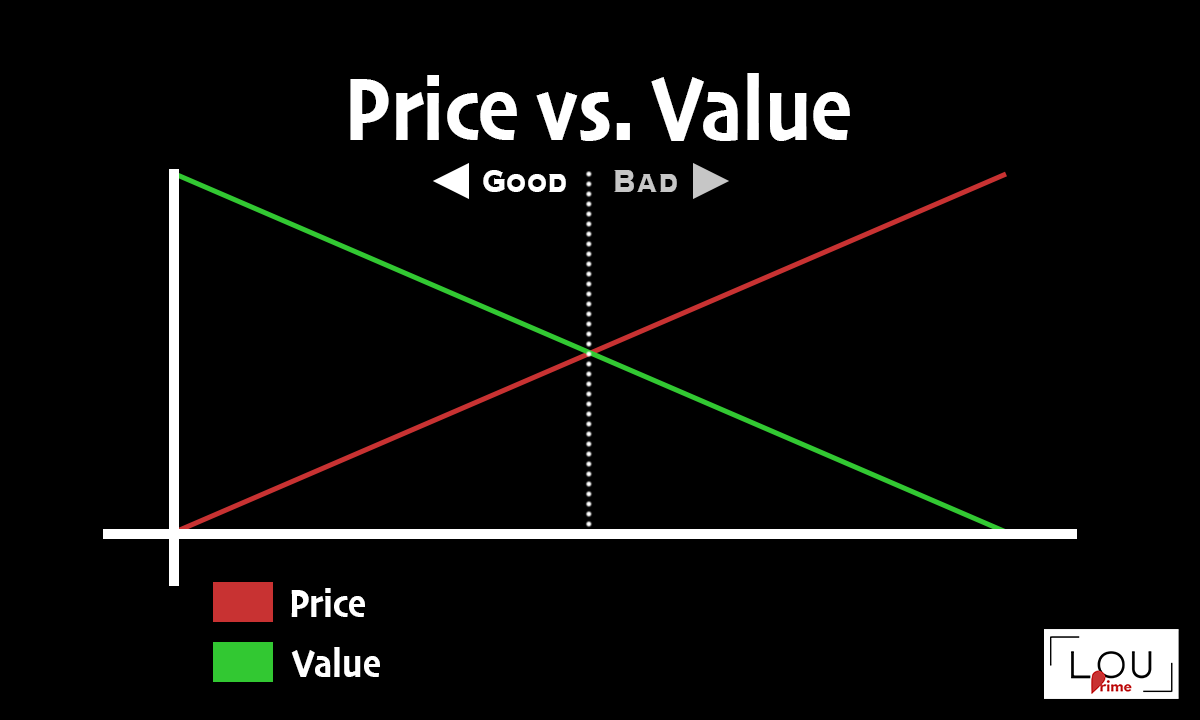
Grammarly
For my use case, the best writing tool I have ever used is Grammarly. During my research phase, I considered each critical factor discussed above.
- It has most of the features I want in a writing tool.
- The tool functions passively and non-intrusively.
- My progress and activity are measured. At the end of each week, I can see some insights about my writing.
- With it, I keep my writing voice consistent, and my audience benefits from the clarity it helps me provide.
- The best part though is that almost all of the important features are present on the Free Tier.
Honestly, I cannot see myself using another tool. This is the best writing tool I have ever used and it ticks all the boxes that are important to me. I highly recommend it to anyone who is serious about their writing. I also find it essential to any person writing in a professional setting, especially one where your writing is reviewed by a boss or read by an audience member.

Grammarly Free Account
Before you can use Grammarly, you need to create a Free Account. Your account can remain on the free level for as long as you use Grammarly. The thing that makes Grammarly the best writing tool is that almost all of the important features are on the Grammarly Free Tier, and you can stay on that tier for eternity.
Grammarly is specially crafted to be used with many of the world’s devices. It is integrated with:
- Windows
- MacOS
- Chrome
- Safari
- Firefox
- Edge (Microsoft)
- MS Office
- Google Docs
- iPhone
- iPad
- Android
- There is even a Grammarly Keyboard!
With these integrated environments, you can get the benefits of Grammarly in almost any software on the planet!
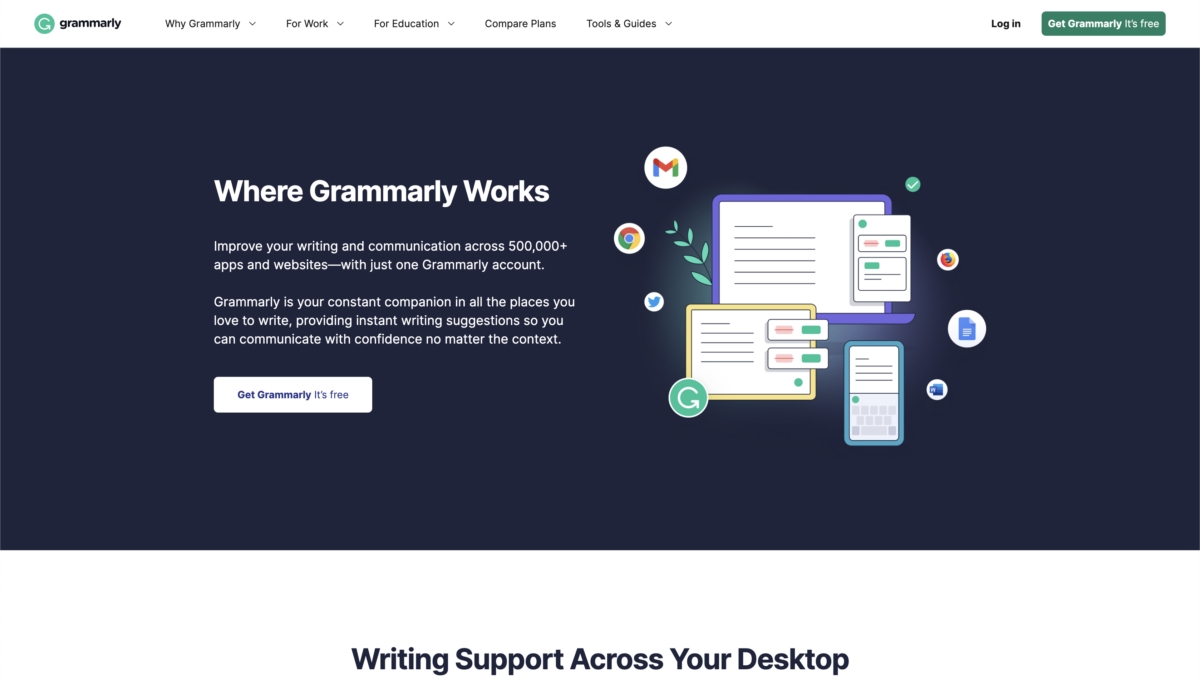
Grammarly Chrome Extension
My personal favorite is the Grammarly Chrome Extension. It works well with both the Grammarly Free Tier and the Grammarly Pro/Business Tiers. Any website that you can type on will make use of the Grammarly Chrome Extension, as long as you access it through Chrome. One big benefit of the Chrome extension is that you can use it on any Operating System that supports Chrome!
In addition to that, the Grammarly Chrome Extension also uses your normal Grammarly account. Any writing you do in Chrome is automatically associated with the same account as your Desktop version. That means all of your writing stats, all of your account settings, and even your subscription level are all shared with every other Grammarly install you have. No special account is required!
On top of all of that, you can install the Chrome extension quickly and get started writing within a couple of minutes! Write confidently on any system that supports Chrome extensions.
Grammarly Pro/Business Account
Maybe you need that extra edge when doing your writing. Perhaps you like that Grammarly Free tells you about the tone of your writing, but would like to upgrade that feature to the next level where Grammarly actually suggests how to change the tone to your liking. Or maybe you like that the Free Tier catches grammar problems but would like to upgrade so that Grammarly can give full-sentence rewrite suggestions, which will make your writing clearer. Maybe you find that their Pro/Business Tiers are reasonably priced and you feel they provide more value than the cost!
Regardless of your reasons, Grammarly Pro & Business both have a whole slew of additional features that can level up your writing. Go from novice to novelist with only a few suggestions from Grammarly’s amazing tech. Impress your co-workers and friends with the fluidity of your writing. Bring it to the next level.
Conclusion
Even if you do not choose Grammarly, it is important to use a writing tool when creating content in a professional setting. The best writing tools help your work stand out. More importantly, millions of people are already using tools like Grammarly to make their writing stand out. Today’s fast-paced digital world makes it almost impossible to progress without the help of such a tool. The fact that it costs nothing is just a bonus!

